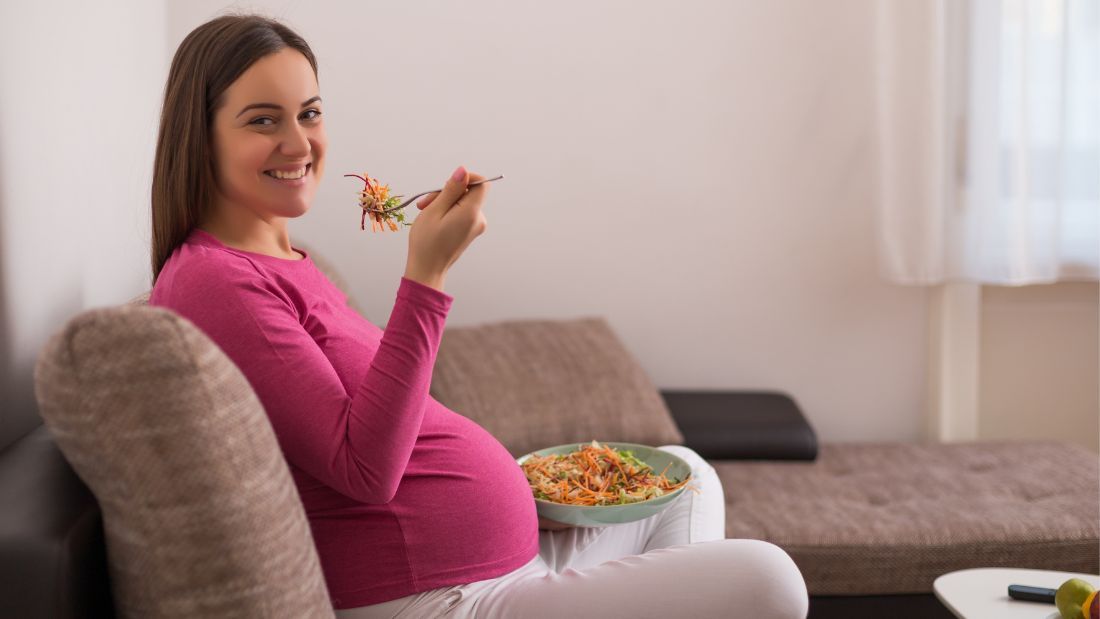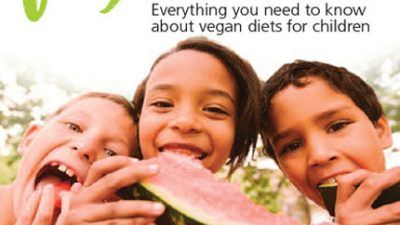What to eat as a pregnant vegan

The basics of vegan maternal nutrition
Not long after you find out you’re pregnant, countless questions will start popping up in your head about what you should and shouldn’t be eating, what to eat when you feel queasy and whether you need something ‘extra’.
What you need
First, you need to know that a vegan diet is perfect for a healthy pregnancy. Thousands of vegan mothers have carried healthy, vivacious babies to a trouble-free birth and major health institutions support veganism as a lifestyle suitable for everyone, including pregnant women.
Being vegan means you’re automatically avoiding many harmful substances, such as heavy metal residues from fish, dangerous bacteria in cheese and eggs and pesticides and cancer-causing chemicals in meat. If anyone tells you that you need to eat meat in pregnancy, you can rest assured it’s not true – there isn’t any special nutrient in meat that you need – but there are plenty of compounds that can harm your baby.
To ensure that you and your baby are well nourished, you need these basic food groups in your diet:
1. Wholegrains (oats/wholegrain breakfast cereal, wholemeal bread and pasta, brown rice, buckwheat, quinoa, barley) – three or four portions daily
2. Pulses (beans, lentils, peas, chickpeas, soya – and products made from them such as hummus, falafels, tofu, beanburgers) – two to four portions daily
3. Nuts and seeds (almonds, cashews, pumpkin seeds and Brazil nuts. For omega-3 fats – flaxseed, hempseed, chia seeds, walnuts) – around two portions daily (a small handful or two tablespoons)
4. Fruit and vegetables (fresh fruit or blended in a homemade smoothie, unsweetened dried fruit, steamed, lightly boiled or baked veggies and a daily serving of dark green leafy vegetables) – five to eight portions daily
5. Extra nutrients (daily):
– at least 50 micrograms of vitamin B12 – important for the nervous system and blood formation
– 400 micrograms of folic acid – to prevent neural tube defects in the foetus
– 400 micrograms (or 10 IU) of vitamin D – crucial for healthy bones and immune system
– 200-500 milligrams of DHA omega-3 oil (from algae-derived oil supplements) – while the recommended dose varies among expert sources, the fact that pregnant women should supplement DHA does not. DHA is needed for foetal brain and retina development.
Generally, pregnant women need about 2,500 calories a day in the later stages of pregnancy and those breastfeeding need up to 3,000 calories. However, everyone is different so take this only as guidance.
Iron
Sufficient iron intake is vital because you’re not only using it for your own blood formation but you’re also creating new blood for your baby. The usual recommended daily dose for women is 14.8 milligrams, which almost doubles in pregnancy.
The best sources of iron are beans, lentils, tofu, nuts and seeds, quinoa, dried figs, apricots and prunes, green leafy vegetables and wholegrain products. Vitamin C helps you to absorb more iron from your food so eat iron-rich foods together with those containing vitamin C, such as citrus fruit, peppers, kiwi, berries, broccoli, spinach and cabbage.
You may also choose to take a supplement, such as Floradix Floravital syrup, which is vegan, contains natural extracts and does not cause constipation.
Calcium
Calcium is needed for the development of bones and teeth but it’s also important for muscle and nerve function. In pregnancy, the efficiency of your calcium absorption increases so the recommended intake is no higher than for the average adult (700 mg). When you start breastfeeding, however, you’ll need almost twice as much so it’s good to get in the habit of eating calcium-rich foods daily.
The best sources of calcium are almonds, sesame seeds and tahini, dried figs, dark green leafy vegetables (kale, broccoli, watercress), butternut squash, beans, tofu, oranges and calcium-fortified plant milks and yoghurts.
Iodine
Iodine is a trace element needed for normal foetal growth and brain development. Seaweed is a rich source but you may easily get too little or too much iodine from it. If you can obtain it, iodised salt is a good way to ensure adequate intake or you can choose to take a kelp supplement or a prenatal supplement with iodine.
Cravings
You may experience intense cravings but it’s not a given. If you do experience them, it’s fine to give in – within reason. Try to ensure you have a mostly balanced diet so your cravings are just a bonus. It is, however, a good idea to limit the amount of sugar, fat and salt you eat as this will help you to have a healthy pregnancy.
Morning sickness
Many mums-to-be experience sickness and it can be brought on by various smells, tastes or situations. It’s also completely normal if your taste changes – what was once your favourite now makes your stomach turn or tastes odd. Another form of ‘morning sickness’ may be persistent mild nausea or loss of appetite.
While all these are common, they do make your life more difficult. There’s no simple remedy – you’ll have to experiment to see what works for you. Ginger or ice cold water may help but when it comes to foods, we’re all different. Bland or salty foods work for some while for others it may be fruit or something more sophisticated. Try not to go without food for more than three hours as that itself can make you feel queasy.
Changing demands
Each trimester is different and your taste and preferences may change along the way. As your baby grows bigger, you’ll have less room in your stomach so you’ll have to eat smaller portions more often. Even if you experience sickness and strange cravings, try to have a healthy diet. Blending foods can be a great help to keep yourself well-nourished – soups and smoothies are easy to pack with nutrients and gentle on the stomach.
Joining an online vegan parenting group is great for experience sharing, questions and encouragement. Anyone can have doubts and talking about them or knowing that others go through something similar is a great help.
Just remember – being vegan sets you up for a healthy pregnancy!






